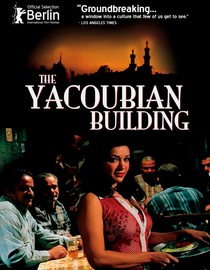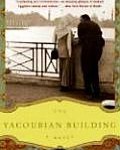Background Egypt: The Yacoubian Building – A Novel and Movie of Cairo
 I rushed home last night to watch the Egyptian movie “The Yacoubian Building,” just arrived from Netflix. It was released in 2006, based on Alaa Al Aswany‘s 2002 novel of the same name [translation to English published in 2006.]
I rushed home last night to watch the Egyptian movie “The Yacoubian Building,” just arrived from Netflix. It was released in 2006, based on Alaa Al Aswany‘s 2002 novel of the same name [translation to English published in 2006.]
I can’t recommend strongly enough seeing this movie (after all the TV coverage of recent days tapers off!) for a great backgrounder on what is going on in Egypt and Cairo these days.
Al Aswany is a founding member of Kefaya, which though I haven’t heard it’s name in any reports, must be right at the center of the citizens’ revolt.
Kefaya (Egyptian Arabic: كفاية kefāya, IPA: [keˈfæːjæ], “enough”) is the unofficial moniker of the Egyptian Movement for Change (Arabic: الحركة المصرية من أجل التغيير el-Haraka el-Masreyya men agl el-Taghyeer), agrassroots coalition which draws its support from across Egypt’s political spectrum to oppose Hosni Mubarak’s presidency and the possibility he may seek to transfer power directly to his son Gamal.
He studied dentistry at the University of Chicago and has written a more recent novel titled Chicago.
The Yacoubian Building uses the structure of the lives of multiple characters intersecting in the Cairo building they all live in — from the extremely wealthy in fine suites, to the very poor, renting what once were storage sheds on the roof. A wealthy gay man seduces a country boy ending his military service. A poor youth, finding himself mocked at the police academy drifts into the Muslim Brotherhood. His girlfriend rejects his religious ways and strikes out on her own, learning how to turn her employer’s lechery to her advantage without compromising all. A wealthy brother and sister engage in fierce fights, lock-outs and law suits.
The film at 2:45 is a trifle long, but it seldom feels that way. Hearing Arabic spoken –with decent subtitles– in all sorts of situations, from love-making to street assassinations, is a treat. An unknown language to most of us, it begins to have a touch of familiarity. We see how embedded the references to God are — in the most unlikely, and even nefarious, situations. They almost seem at times to be what are called in linguistics “frozen metaphors,” where the original image is no longer heard in speech; it’s just an utterance said in a certain situation. ”Bless you,” after someone sneezes, saying someone is “boiling mad,” or “a book worm,” or “she is glued to the television.”
The sexual content is both surprising and informative. Despite the far more enveloping sexual-social conservatism in Egypt, as compared to the US, the “force that through the green fuse drives the flower,” in Dylan Thomas’s unforgettable line, continues to drive. What we might barely notice is a bold flirtation, and is understood as such by both parties. The women, however subordinate in law and custom, show themselves to be fierce defenders of themselves and their values.
Do get and watch this movie.
I haven’t read the novel yet but there is a short excerpt, which appears in the movie, in The Anchor Book of Modern Arabic Fiction. [click on the p 38 link]
No Comments
No comments yet.
RSS feed for comments on this post.
Sorry, the comment form is closed at this time.


